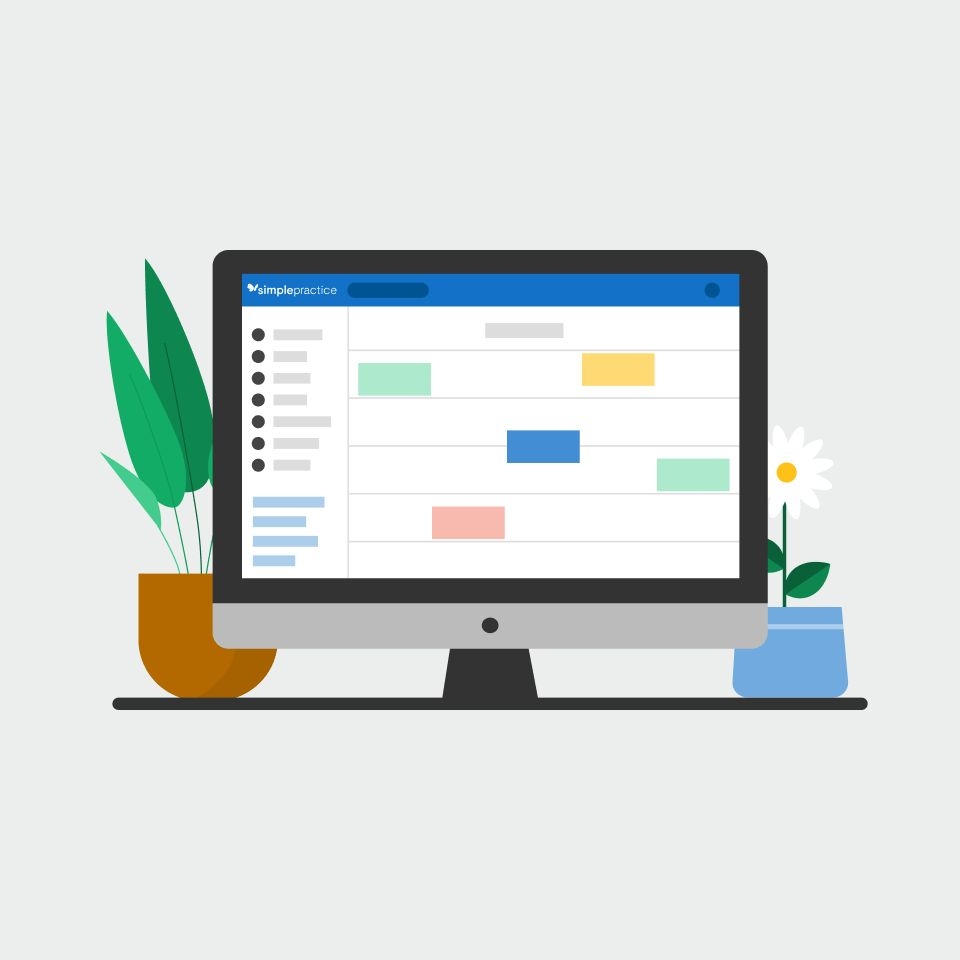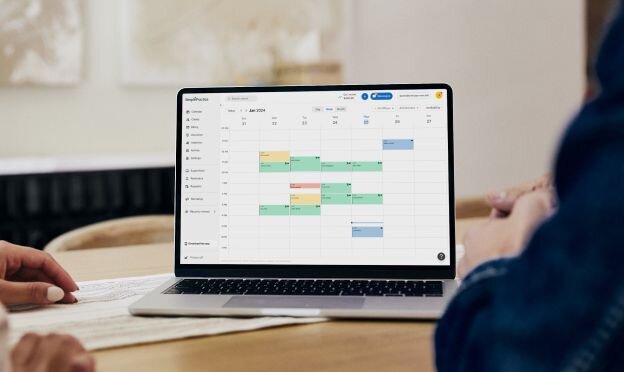Benefits of an EHR: How Software Can Support Private Practice

As a private practitioner, you have a lot to keep track of. The billing, scheduling, appointment reminders—it’s all on you, on top of the actual work of seeing clients.
One of the biggest benefits of an EHR is that it helps you manage all of the day-to-day work that’s necessary for running a business, while still letting you focus your time and energy on your clients.
Here, we’ll run through some of the core EHR benefits, and how they can help you streamline how you run your practice.
6 benefits of an EHR
The core features and functionality of an EHR—and the benefits—aren’t just for clinicians. There are benefits of an EHR for clients as well, and the two inform each other.
EHR benefits for clinicians
There are several benefits of an EHR for clinicians, perhaps the largest being that it allows you to spend time you would have spent on administrative tasks with your clients instead. Here are a few EHR benefits for clinicians, and how they might impact your practice:
No more paper notes
If you’re not using an EHR to keep your client records, then you’re probably keeping pen-and-paper charts in an office somewhere. Though this is how records were kept for years and may work for some people, a digital version of client notes kept in a practice management software has a few different benefits.
One of the key benefits of an EHR is that keeping digital records simply takes up less space, freeing up your office space for something else—or possibly removing the need for your office altogether. You’ll also use less paper, ink, and other office supplies by keeping electronic records, and you won’t need to pay for labor (or use your own time) to update and upkeep dozens of physical charts.
Reduced costs
While there is a cost associated with an EHR software, your other costs, like the ones mentioned above associated with a physical office and paper records, may go down. Another benefit of an EHR is it gives you the option to run a virtual practice, eliminating the need for office related expenses like rent, utilities, and the like entirely.
An EHR system can also help you save on labor costs. Though some private practitioners still may choose to hire a biller or other administrative support, an EHR benefit is it gives you the tools to be able to manage those parts of your business without additional support.
Increased efficiency
With so much to manage, another benefit of an EHR is it helps clinicians be more efficient in their day to day business—so they can spend more time with clients, but also on things outside of work. Automated features for billing, generating invoices, and creating appointment reminders mean less labor for a clinician or administrative employee, and are easy to generate and send to clients quickly, or on the go if needed.
EHR software also allows practices to keep track of everything they need for their business, from payroll reports to client notes, in one secure place. This eliminates the need to keep track of multiple logins, notebooks, or other documentation, and makes it quick and easy for a clinician to manage their entire practice from one software.
If your EHR software has a mobile app, then another EHR benefit is you can also probably do all of your billing, scheduling, and note-taking from your mobile device—meaning you can attend to other parts of your life without necessarily sacrificing your business.
Increased security
Another key benefit of an EHR is the enhanced security it offers to your practice and your clients’ data. Paper records can be more vulnerable to stray eyes or other security risks, and any top-rated EHR system will be HIPAA-compliant (and hopefully HiTRUST certified).
This gives you peace of mind knowing that you’ve done everything you can to protect your clients and your practice from potential data violations—and gives your clients that same peace of mind as well.
EHR benefits for clients
As you can see from some of the EHR benefits for clinicians, there are benefits for clients as well when their provider uses an EHR software. Here are a few of the ways clients can benefits from a practice management software:
Increased quality of care
As a byproduct of practices running more efficiently, the quality of care clients receive increases as well. Mental health EHRs help clinicians keep more accurate and up-to-date information about their clients, which can help eliminate inaccuracies in records.
One key benefit of an EHR is how easy it is for clinicians to update records and adapt treatment plans as needed in real time—and also share those records with other specialists, if that’s what the client needs.
EHR software makes it easy for clinicians to send appointment reminders, reschedule appointments, and in some cases write and send prescriptions—all ensuring seamless continuity of care for their clients, making sure nothing falls through the cracks.
Perhaps the largest EHR benefit is it helps prevent clinician burnout, which in turn has a direct impact on the quality of time they spend with their clients and the treatment they get.
Increased client engagement
A client portal is another benefit of an EHR, and most top-rated EHRs should have this feature built in. Client portals allow clients to sign their intake forms, access their records, view and pay invoices, and send secure messages—all of which help them feel more engaged and in control of their care. These features give clients more autonomy in the process, which in turn helps them feel more engaged and can have positive clinical outcomes as well.
Other features of behavioral health EHRs, like screensharing and whiteboard features during telehealth appointments, can allow even remote appointments to be interactive and engaging for clients of all ages.
Switching to a practice management system
If you’ve weighed out all the benefits of an EHR and decided it makes sense for your practice, then all that’s left for you to do is to try it out.
As the preferred practice management software for over 178,000 private practice clinicians, SimplePractice offers key EHR benefits and features that will save you time and remove paperwork.
SimplePractice makes it easy to run a fully paperless practice. Upload your client data, whether from another EHR system or from a pen-and-paper practice, and get started running your business right away. Save time with hundreds of custom templates for progress notes, SOAP notes, assessments, intake forms, and more.
Sign up for a free, 30-day trial of SimplePractice to experience the benefits of EHR functionality for your business and your clients.

